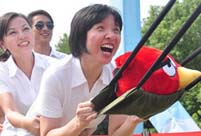In Shanghai, competition starts as early as preschool. To level the educational playing field, the Shanghai Municipal Education Commission has urged all primary schools in the city to "teach from zero," an initiative started last year as a trial which is in full swing this year.
A little background might be necessary for those who aren't familiar with Shanghai's preschool education scene. According to reports, so many preschoolers attend private training classes teaching primary school-level content that many primary schools are skipping the groundwork and teaching directly from where the majority of students left off in kindergarten.
The prevalence of primary school-level courses aimed at Shanghai's four- and five-year-olds was highlighted in a survey conducted by the education commission earlier this year. It selected six kindergartens in six districts and polled the parents and teachers on the percentage of kids who took at least one after-school class. The result was a staggering 88 percent. On top of that, over 32 percent of children took classes on three to five different subjects. The most popular subjects of study are pinyin and English, both of which are taught in primary school, followed by painting, musical instruments, dancing, brain training, sports, calligraphy and recognizing Chinese characters.
The result is that many primary schools now skip or speed up lessons on basics like pinyin and the alphabet in their curriculum. A parent recently told me that in her child's grade-one class, the teacher asked the students whether they had learned pinyin before. When over 80 percent of the kids raised their hands, she announced that the classes on pinyin would be skipped. Those who hadn't learned pinyin before were urged to catch up with their peers by taking extracurricular courses.
This is a dangerous trend. Firstly, kindergarteners are unnecessarily burdened with academic pressures at an age that should be carefree. This isn't like high school students preparing for college calculus. Many education experts have pointed out that the priority for preschool children is to learn about the world by interacting with it, guided by their natural curiosity, and not to acquire as many skills and facts as possible.
Secondly, these kindergarten kids all took their pinyin or English classes in training centers, rather than proper schools. This means their first experiences with formal education, their learning habits and their notion of a classroom are formed not in a school but in a training center. When they attend a primary school class, they bring their different learning habits there, which is challenging to their teacher and detrimental to their future study.
The education commission's new initiative aims to tackle these problems. But will it work? As early as 2004, in an attempt to lesson the burden of primary school students, the commission specified in an annual document on the planning of primary and middle school curriculums that primary schools should not organize midterm exams. However, this was never strictly followed by the schools, which, just like the students, are burdened by parental expectations of their children's performance and by middle school enrolment rates.
Another question is whether this initiative will have a practical impact on reducing preschool training. Will parents refrain from sending their children to these preschool courses once they know everything will be taught again in primary school? It seems unlikely. On the contrary, if they find that school education does not meet their expectations, they might send their children to more training centers, where young kids are crammed with exam papers and classes.
Intensive preschool education is an inevitable trend with roots in China's inveterate exam-oriented education system that puts too much emphasis on grades. To reverse the trend would require a systematic change of Chinese education, and it's far more complicated than a simple government initiative.
 Finland has more eggs in the Chinese basket than any other
Finland has more eggs in the Chinese basket than any other In pictures: PLA's digital equipment
In pictures: PLA's digital equipment  Protesters demonstrate during UN Climate Change Conference in Poland
Protesters demonstrate during UN Climate Change Conference in Poland  Self-made farmer billionaire donates 69 villas at hometown
Self-made farmer billionaire donates 69 villas at hometown Demolition of bizarre rooftop villa in Beijing still in progress
Demolition of bizarre rooftop villa in Beijing still in progress Service seminar for E China train attendants
Service seminar for E China train attendants  Supermodel-turned-designer
Supermodel-turned-designer Cheerleaders light up CBA regular season
Cheerleaders light up CBA regular season  Finland--anytime you want is right time to go: Ambassador
Finland--anytime you want is right time to go: Ambassador Maritime counter-terrorism drill
Maritime counter-terrorism drill Splendid views of cities blanketed with fog
Splendid views of cities blanketed with fog  Models dazzle at Int'l Yacht Model Pageant
Models dazzle at Int'l Yacht Model Pageant  How to apply for a green card in China
How to apply for a green card in China Annual Santa Claus parade held in Canada's Montreal
Annual Santa Claus parade held in Canada's Montreal Weekly Sports Photos
Weekly Sports PhotosDay|Week|Month